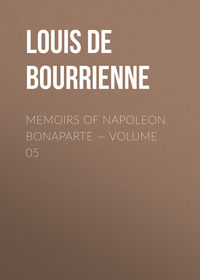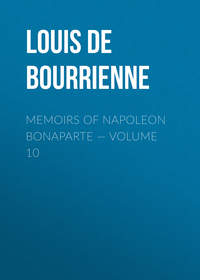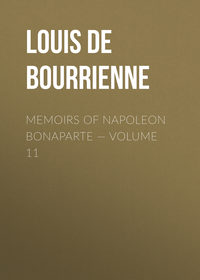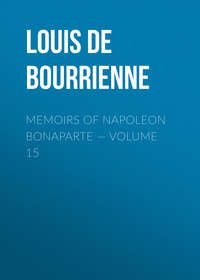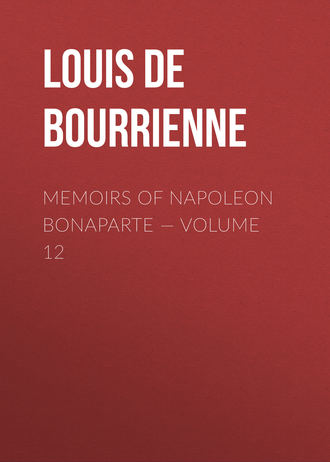 полная версия
полная версияMemoirs of Napoleon Bonaparte — Volume 12
I observed from the expression of Caulaincourt's countenance that my question had made an impression on him, and affectionately pressing my hand he said, "I would do as you do: Enough. I will arrange the business with the Emperor." This reply seemed to remove a weight from my mind, and I left Caulaincourt with feelings of gratitude. I felt fully assured that he would settle the business satisfactorily, and in this conjecture I was not deceived, for I heard no more of the matter.
I must here go forward a year to relate another occurrence in which the Due de Vicence and I were concerned. When, in March 1815, the King appointed me Prefect of Police, M. de Caulaincourt sent to me a confidential person to inquire whether he ran any risk in remaining in Paris, or whether he had better remove. He had been told that his name was inscribed in a list of individuals whom I had received orders to arrest. Delighted at this proof of confidence, I returned the following answer by the Due de Vicence's messenger: "Tell M. de Caulaincourt that I do not know where he lives. He need be under no apprehension: I will answer for him."
During the campaign of 1813 the Allies, after driving the French out of Saxony and obliging them to retreat towards the Rhine, besieged Hamburg, where Davoust was shut up with a garrison of 30,000 men, resolutely determined to make it a second Saragossa. From the month of September every day augmented the number of the Allied troops, who were already making rapid progress on the left bank of the Elbe. Davoust endeavoured to fortify Hamburg an so extended a scale that, in the opinion of the most experienced military men, it would have required a garrison of 60,000 men to defend it in a regular and protracted siege. At the commencement of the siege Davoust lost Vandamme, who was killed in a sortie at the head of a numerous corps which was inconsiderately sacrificed.
It is but justice to admit that Davoust displayed great activity in the defence, and began by laying in large supplies.
—[Vandamme fought under Grouchy in 1815, and died several years afterwards. This killing him at Hamburg is one of the curious mistakes seized on by the Bonapartists to deny the authenticity of these Memoirs.]—
General Bertrand was directed to construct a bridge to form a communication between Hamburg and Haarburg by joining the islands of the Elbe to the Continent along a total distance of about two leagues. This bridge was to be built of wood, and Davoust seized upon all the timber- yards to supply materials for its construction. In the space of eighty- three days the bridge was finished. It was a very magnificent structure, its length being 2529 toises, exclusive of the lines of junction, formed on the two islands.
The inhabitants were dreadfully oppressed, but all the cruel measures and precautions of the French were ineffectual, for the Allies advanced in great force and occupied Westphalia, which movement obliged the Governor of Hamburg to recall to the town the different detachments scattered round Hamburg.
At Lubeck the departure of the French troops was marked by blood. Before they evacuated the town, an old man, and a butcher named Prahl, were condemned to be shot. The butcher's crime consisted in having said, in speaking of the French, "Der teufel hohle sie" (the devil take them). The old man fortunately escaped his threatened fate, but, notwithstanding the entreaties and tears of the inhabitants, the sentence upon Prahl was carried into execution.
The garrison of Hamburg was composed of French, Italian, and Dutch troops. Their number at first amounted to 30,000, but sickness made great-havoc among them. From sixty to eighty perished daily in the hospitals. When the garrison evacuated Hamburg in May 1814 it was reduced to about 15,000 men. In the month of December provisions began to diminish, and there was no possibility of renewing the supply. The poor were first of all made to leave the town, and afterwards all persons who were not usefully employed. It is no exaggeration to estimate at 50,000 the number of persons who were thus exiled. The colonel commanding the gendarmerie at Hamburg notified to the exiled inhabitants that those who did not leave the town within the prescribed time would receive fifty blows with a cane and afterwards be driven out. But if penance may be commuted with priests so it may with gendarmes. Delinquents contrived to purchase their escape from the bastinado by a sum of money, and French gallantry substituted with respect to females the birch for the cane. I saw an order directing all female servants to be examined as to their health unless they could produce certificates from their masters. On the 25th of December the Government granted twenty-four hours longer to persons who were ordered to quit the town; and two days after this indulgence an ordinance was published declaring that those who should return to the town after once leaving it were to be considered as rebels and accomplices of the enemy, and as such condemned to death by a prevotal court. But this was not enough. At the end of December people, without distinction of sex or age, were dragged from their beds and conveyed out of the town on a cold night, when the thermometer was between sixteen or eighteen degrees; and it was affirmed that several old men perished in this removal. Those who survived were left on the outside of the Altona gates. At Altona they all found refuge and assistance. On Christmas-day 7000 of these unfortunate persons were received in the house of M. Rainville, formerly aide de camp to Dumouriez, and who left France together with that general. His house, which was at Holstein, was usually the scene of brilliant entertainments, but it was converted into the abode of misery, mourning, and death. All possible attention was bestowed on the unfortunate outlaws; but few profited by it, and what is worse, the inhabitants of Altona suffered for their generosity. Many of the unfortunate persons were affected with the epidemic disease which was raging in Hamburg, and which in consequence broke out at Altona.
All means of raising money in Hamburg being exhausted, a seizure was made of the funds of the Bank of that city, which yet contained from seven to eight millions of marks. Were those who ordered this measure not aware that to seize on the funds of some of the citizens of Hamburg was an injury to all foreigners who had funds in the Bank? Such is a brief statement of the vexations and cruelties which long oppressed this unfortunate city. Napoleon accused Hamburg of Anglomania, and by ruining her he thought to ruin England. Hamburg, feeble and bereft of her sources, could only complain, like Jerusalem when besieged by Titus: "Plorans, plorcatrit in nocte."
CHAPTER XXXII
1813-1814.
Prince Eugene and the affairs of Italy—The army of Italy on the frontiers of Austria—Eugene's regret at the defection of the Bavarians—Murat's dissimulation and perfidy—His treaty with Austria—Hostilities followed by a declaration of war—Murat abandoned by the French generals—Proclamation from Paris—Murat's success—Gigantic scheme of Napoleon—Napoleon advised to join the Jacobins—His refusal—Armament of the National Guard—The Emperor's farewell to the officers—The Congress of Chatillon—Refusal of an armistice—Napoleon's character displayed in his negotiations— Opening of the Congress—Discussions—Rupture of the Conferences.
I wars now proceed to notice the affairs of Italy and the principal events of the Viceroyalty of Eugene. In order to throw together all that I have to say about the Viceroy I must anticipate the order of time.
After the campaign of 1812, when Eugene revisited Italy, he was promptly informed of the more than doubtful dispositions of Austria towards France. He then made preparations for raising an army capable of defending the country which the Emperor had committed to his safeguard. Napoleon was fully aware how much advantage he would derive from the presence on the northern frontiers of Italy of an army sufficiently strong to harass Austria, in case she should draw aside the transparent veil which still covered her policy. Eugene did all that depended on him to meet the Emperor's wishes; but in spite of his efforts the army of Italy was, after all; only an imaginary army to those who could compare the number of men actually enrolled with the numbers stated in the lists. When, in July 1813, the Viceroy was informed of the turn taken by the negotiations at the shadow of a Congress assembled at Prague, he had no longer any doubt of the renewal of hostilities; and foreseeing an attack on Italy he resolved as speedily as possible to approach the frontiers of Austria. He had succeeded in assembling an army composed of French and Italians, and amounting to 45,000 infantry and 5000 cavalry. On the renewal of hostilities the Viceroy's headquarters were at Udine. Down to the month of April 1814 he succeeded in maintaining a formidable attitude, and in defending the entrance of his kingdom by dint of that military talent which was to be expected in a man bred in the great school of Napoleon, and whom the army looked up to as one of its most skillful generals.
During the great and unfortunate events of 1813 all eyes had been fixed on Germany and the Rhine; but the defection of Murat for a time diverted attention to Italy. That event did not so very much surprise me, for I had not forgotten my conversation with the King of Naples in the Champs Elysees, with which I have made the reader acquainted. At first Murat's defection was thought incredible by every one, and it highly excited Bonaparte's indignation. Another defection which occurred about the same period deeply distressed Eugene, for although raised to the rank of a prince, and almost a sovereign, he was still a man, and an excellent man. He was united to the Princess Amelia of Bavaria, who was as amiable and as much beloved as he, and he had the deep mortification to count the subjects of his father-in-law among the enemies whom he would probably have to combat. Fearing lest he should be harassed by the Bavarians on the side of the Tyrol, Eugene commenced his retrograde movement in the autumn of 1813. He at first fell back on the Tagliamento, and successively on the Adige. On reaching that river the army of Italy was considerably diminished, in spite of all Eugene's care of his troops. About the end of November Eugene learned that a Neapolitan corps was advancing upon Upper Italy, part taking the direction of Rome, and part that of Ancona. The object of the King of Naples was to take advantage of the situation of Europe, and he was duped by the promises held out to him as the reward of his treason. Murat seemed to have adopted the artful policy of Austria; for not only had he determined to join the coalition, but he was even maintaining communications with England and Austria, while at the same time he was making protestations of fidelity to his engagements with Napoleon.
When first informed of Murat's treason by the Viceroy the Emperor refused to believe it. "No," he exclaimed to those about him, "it cannot be! Murat, to whom I have given my sister! Murat, to whom I have given a throne! Eugene must be misinformed. It is impossible that Murat has declared himself against me!" It was, however, not only possible but true. Gradually throwing aside the dissimulation beneath which he had concealed his designs, Murat seemed inclined to renew the policy of Italy during the fifteenth and sixteenth centuries, when the art of deceiving was deemed by the Italian Governments the most sublime effort of genius. Without any declaration of war, Murat ordered the Neapolitan General who occupied Rome to assume the supreme command in the Roman States, and to take possession of the country. General Miollis, who commanded the French troops in Rome, could only throw himself, with his handful of men, into the Castle of St. Angelo, the famous mole of Adrian, in which was long preserved the treasury of Sixtus V. The French General soon found himself blockaded by the Neapolitan troops, who also blockaded Civita Vecchia and Ancona.
The treaty concluded between Murat and Austria was definitively signed on the 11th of January 1814. As soon as he was informed of it the Viceroy, certain that he should soon have to engage with the Neapolitans, was obliged to renounce the preservation of the line of the Adige, the Neapolitan army being in the rear of his right wing. He accordingly ordered a retrograde movement to the other side of the Mincio, where his army was cantoned. In this position Prince Eugene, on the 8th of February, had to engage with the Austrians, who had come up with him, and the victory of the Mincio arrested, for some time, the invasion of the Austrian army and its junction with the Neapolitan troops.
It was not until eight days after that Murat officially declared war against the Emperor; and immediately several general and superior officers, and many French troops, who were in his service, abandoned him, and repaired to the headquarters of the Viceroy. Murat made endeavours to detain them; they replied, that as he had declared war against France, no Frenchman who loved his country could remain in his service. "Do you think," returned he, "that my heart is lees French than yours? On the contrary, I am much to be pitied. I hear of nothing but the disasters of the Grand Army. I have been obliged to enter into a treaty with the Austrians, and an arrangement with the English, commanded by Lord Bentinck, in order to save my Kingdom from a threatened landing of the English and the Sicilians, which would infallibly have excited an insurrection."
There could not be a more ingenuous confession of the antipathy which Joachim knew the Neapolitans to entertain towards his person and government. His address to the French was ineffectual. It was easy to foresee what would ensue. The Viceroy soon received an official communication from Napoleon's War Minister, accompanied by an Imperial decree, recalling all the French who were in the service of Joachim, and declaring that all who were taken with arms in their hands should be tried by a courtmartial as traitors to their country. Murat commenced by gaining advantages which could not be disputed. His troops almost immediately took possession of Leghorn and the citadel of Ancona, and the French were obliged to evacuate Tuscany.
The defection of Murat overthrew one of Bonaparte's gigantic conceptions. He had planned that Murat and Eugene with their combined forces should march on the rear of the Allies, while he, disputing the soil of France with the invaders, should multiply obstacles to their advance; the King of Naples and the Viceroy of Italy were to march upon Vienna and make Austria tremble in the heart of her capital before the timid million of her Allies, who measured their steps as they approached Paris, should desecrate by their presence the capital of France. When informed of the vast project, which, however, was but the dream of a moment, I immediately recognised that eagle glance, that power of discovering great resources in great calamities, so peculiar to Bonaparte.
Napoleon was yet Emperor of France; but he who had imposed on all Europe treaties of peace no less disastrous than the wars which had preceded them, could not now obtain an armistice; and Caulaincourt, who was sent to treat for one at the camp of the Allies, spent twenty days at Luneville before he could even obtain permission to pass the advanced posts of the invading army. In vain did Caulaincourt entreat Napoleon to sacrifice, or at least resign temporarily, a portion of that glory acquired in so many battles, and which nothing could efface in history. Napoleon replied, "I will sign whatever you wish. To obtain peace I will exact no condition; but I will not dictate my own humiliation." This concession, of course, amounted to a determination not to sign or to grant anything.
In the first fortnight of January 1814 one-third of France was invaded, and it was proposed to form a new Congress, to be held at Chatillon-sur- Seine. The situation of Napoleon grew daily worse and worse. He was advised to seek extraordinary resources in the interior of the Empire, and was reminded of the fourteen armies which rose, as if by enchantment, to defend France at the commencement of the Revolution. Finally, a reconciliation with the Jacobins, a party who had power to call up masses to aid him, was recommended. For a moment he was inclined to adopt this advice. He rode on horseback through the surburbs of St. Antoine and St. Marceau, courted the populace, affectionately replied to their acclamations, and he thought he saw the possibility of turning to account the attachment which the people evinced for him. On his return to the Palace some prudent persons ventured to represent to him that, instead of courting this absurd sort of popularity it would be more advisable to rely on the nobility and the higher classes of society. "Gentlemen," replied he, "you may say what you please, but in the situation in which I stand my only nobility is the rabble of the faubourgs, and I know of no rabble but the nobility whom I have created." This was a strange compliment to all ranks, for it was only saying that they were all rabble together.
At this time the Jacobins were disposed to exert every effort to serve him; but they required to have their own way, and to be allowed freely to excite and foster revolutionary sentiments. The press, which groaned under the most odious and intolerable censorship, was to be wholly resigned to them. I do not state these facts from hearsay. I happened by chance to be present at two conferences in which were set forward projects infected with the odour of the clubs, and these projects were supported with the more assurance because their success was regarded as certain. Though I had not seen Napoleon since my departure for Hamburg, yet I was sufficiently assured of his feeling towards the Jacobins to be convinced that he would have nothing to do with them. I was not wrong. On hearing of the price they set on their services he said, "This is too much; I shall have a chance of deliverance in battle, but I shall have none with these furious blockheads. There can be nothing in common between the demagogic principles of '93 and the monarchy, between clubs of madmen and a regular Ministry, between a Committee of Public Safety and an Emperor, between revolutionary tribunals and established laws. If fall I must, I will not bequeath France to the Revolution from which I have delivered her."
These were golden words, and Napoleon thought of a more noble and truly national mode of parrying the danger which threatened him. He ordered the enrolment of the National Guard of Paris, which was placed under the command of Marshal Moncey. A better choice could not have been made, but the staff of the National Guard was a focus of hidden intrigues, in which the defence of Paris was less thought about than the means of taking advantage of Napoleon's overthrow. I was made a captain in this Guard, and, like the rest of the officers, I was summoned to the Tuileries, on the 23d of January, when the Emperor took leave of the National Guard previously to his departure from Paris to join the army.
Napoleon entered with the Empress. He advanced with a dignified step, leading by the hand his son, who was not yet three years old. It was long since I had seen him. He had grown very corpulent, and I remarked on his pale countenance an expression of melancholy and irritability.
The habitual movement of the muscles of his neck was more decided and more frequent than formerly. I shall not attempt to describe what were my feelings during this ceremony, when I again saw, after a long separation, the friend of my youth, who had become master of Europe, and was now on the point of sinking beneath the efforts of his enemies. There was something melancholy in this solemn and impressive ceremony. I have rarely witnessed such profound silence in so numerous an assembly. At length Napoleon, in a voice as firm and sonorous as when he used to harangue his troops in Italy or in Egypt, but without that air of confidence which then beamed on his countenance, delivered to the assembled officers an address which was published in all the journals of the time. At the commencement of this address he said, "I set out this night to take the command of the army. On quitting the capital I confidently leave behind me my wife and my son, in whom so many hopes are centred." I listened attentively to Napoleon's address, and, though he delivered it firmly, he either felt or feigned emotion. Whether or not the emotion was sincere on his part, it was shared by many present; and for my own part I confess that my feelings were deeply moved when he uttered the words, "I leave you my wife and my son." At that moment my eyes were fixed on the young Prince, and the interest with which he inspired me was equally unconnected with the splendour which surrounded and the misfortunes which threatened him. I beheld in the interesting child not the King of Rome but the son of my old friend. All day long afterwards I could not help feeling depressed while comparing the farewell scene of the morning with the day on which we took possession of the Tuileries. How many centuries seemed the fourteen years which separated the two events.
It may be worth while to remind those who are curious in comparing dates that Napoleon, the successor of Louis XVI., and who had become the nephew of that monarch by his marriage with the niece of Marie Antoinette, took leave of the National Guard of Paris on the anniversary of the fatal 21st of January, after twenty-five years of successive terror, fear, hope, glory, and misfortune.
Meanwhile, a Congress was opened at Chatillon-sur-Seine, at which were assembled the Duke of Vicenza on the part of France, Lords Aderdeen and Cathcart and Sir Charles Stewart as the representatives of England, Count Razumowsky on the part of Russia, Count Stadion for Austria, and Count Humboldt for Prussia. Before the opening of the Congress, the Duke of Vicenza, in conformity with the Emperor's orders, demanded an armistice, which is almost invariably granted during negotiations for peace; but it was now too late: the Allies had long since determined not to listen to any such demand. They therefore answered the Duke of Vicenza's application by requiring that the propositions for peace should be immediately signed. But these were not the propositions of Frankfort. The Allies established as their bases the limits of the old French monarchy. They conceived themselves authorised in so doing by their success and by their situation.
To estimate rightly Napoleon's conduct during the negotiations for peace which took place in the conferences at Chatillon it is necessary to bear in mind the organisation he had received from nature and the ideas with which that organisation had imbued him at an early period of life. If the last negotiations of his expiring reign be examined with due attention and impartiality it will appear evident that the causes of his fall arose out of his character. I cannot range myself among those adulators who have accused the persons about him with having dissuaded him from peace. Did he not say at St. Helena, in speaking of the negotiations at Chatillon, "A thunderbolt alone could have saved us: to treat, to conclude, was to yield foolishly to the enemy." These words forcibly portray Napoleon's character. It must also be borne in mind how much he was captivated by the immortality of the great names which history has bequeathed to our admiration, and which are perpetuated from generation to generation. Napoleon was resolved that his name should re- echo in ages to come, from the palace to the cottage. To live without fame appeared to him an anticipated death. If, however, in this thirst for glory, not for notoriety, he conceived the wish to surpass Alexander and Caesar, he never desired the renown of Erostratus, and I will say again what I have said before, that if he committed actions to be condemned, it was because he considered them as steps which helped him to place himself on the summit of immortality on which he wished to place his name. Witness what he wrote to his brother Jerome, "Better never, to have lived than to live without glory;" witness also what he wrote later to his brother Louis, "It is better to die as a King than to live as a Prince." How often in the days of my intimacy with Bonaparte has he not said to me, "Who knows the names of those kings who have passed from the thrones on which chance or birth seated them? They lived and died unnoticed. The learned, perhaps, may find them mentioned in old archives, and a medal or a coin dug from the earth may reveal to antiquarians the existence of a sovereign of whom they had never before heard. But, on the contrary, when we hear the names of Cyrus, Alexander, Caesar, Mahomet, Charlemagne, Henry IV., and Louis XIV., we are immediately among our intimate acquaintance." I must add, that when Napoleon thus spoke to me in the gardens of Malmaison he only repeated what had often fallen from him in his youth, for his character and his ideas never varied; the change was in the objects to which they were applied.



